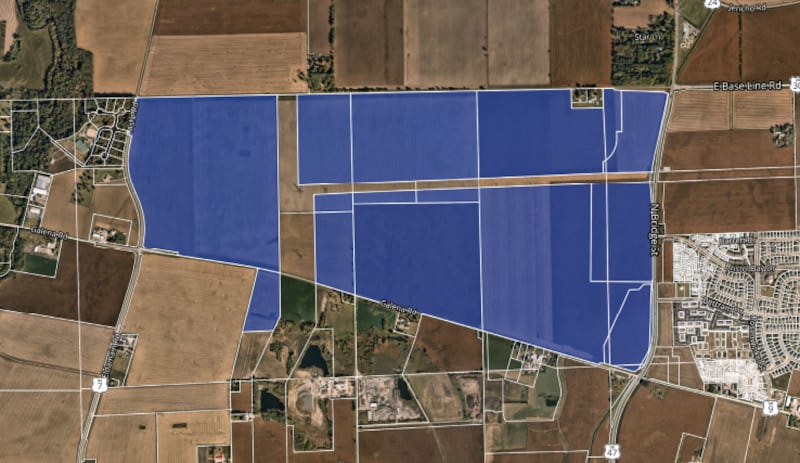The big one is coming a little clearer into view.
The biggest project in Yorkville’s data center alley, spanning a 1,037 acres, will become the city’s largest ever manufacturing development. While several residents have voiced concerns against data centers near their residential areas, more than 3,000 acres of former farmland is slated for massive industrial warehouses by the city.
That’s more acreage than 31 of the proposed Costco in Yorkville.
Along with requesting that Pioneer Development, LLC, the developers of the ‘Project Cardinal data center’ adhere to the city’s suggestion of a minimum 500-foot building setback from the nearest residential or commercial structure, city officials have requested the warehouses not be “light gray” as currently drawn.
“Staff further recommends buildings visible from Route 47 have the highest aesthetic standards that can be economically achieved,” according to city documents. “It is important that these structures, which will be located at the entrance into the city, make a statement.”
City Administrator Bart Olson previously said that data centers campuses, like the already-approved Cyrus-One project, are desirable for the city because each building can generate up to $1 million in tax revenues annually. The buildings also require minimum staffing and do not increase the town’s population, like a subdivision, which would further exacerbate Yorkville School District 115’s classroom capacity issues.
Plans outline 14 two-story data center warehouses totaling more than 17 million square feet. The campus would include two electrical substations and 3,750 total parking spaces. The construction would be phased, with full completion expected to take up to 10 years.
The campus site, which must be rezoned to manufacturing, is located northwest of Route 47 and Galena Road, south of Baseline Road, and east of Ashe Road.
:quality(70)/cloudfront-us-east-1.images.arcpublishing.com/shawmedia/IGDRYERJCVDZ3DY4P5G46FFF4I.png)
Because of the scale of the construction, the developers must meet and gather feedback from homeowners in the Bristol Bay Subdivision, located to the east, and with Equestrian Estates at 14 Legacy Farms, located to the west. They also must meet with several property owners along Baseline Road, Eldamain Road, and Galena Road.
Following the developers meeting with adjacent homeowners, a public hearing is scheduled for the annexation of 305 acres of the total 1,037-acre site at the June 10 city council meeting. A public hearing for the rezoning, and the overall development plans, is scheduled for the June 11 planning and zoning meeting at City Hall.
City officials currently expect a final vote for the full development at the July 8 City Council meeting.
As part of the developer’s agreement with the city, the developers are paying for a sound pollution mitigation study to measure the potential impact on the surrounding area. The developers are required to create a mitigation plan to ensure that “operational noise does not exceed the city’s current noise ordinance regulations,” according to city documents.
The city also is requiring a noise monitoring study to be conducted for three years after construction is completed to ensure the data center campus is meeting noise compliance regulations.
The developers also are required to establish an Emergency Operations Plan, containing procedures for fire suppression, hazardous material spills, evacuation and communication in case of an incident.
The data center campus is required to install an eight-foot-tall berm along the perimeters, capping off the 100-foot landscape buffer to the site’s four neighboring roadways.
:quality(70)/cloudfront-us-east-1.images.arcpublishing.com/shawmedia/FO2XBNK6TFAXBPZUVEKXBOA4GQ.png)
The city is requesting the developers to construct multi-use walking and bicycle trails on the outer perimeter of the site, along Ashe Road and Galena Road north to Baseline Road. A trail also must be constructed along Baseline Road, from Ashe Road and Eldamain Road to Route 47.
The city has agreed to wave the requirement on the developers installing electric vehicle charging stations in the data center’s parking lots, if the developers pay a fee to enable the construction of 104 electric vehicle charging stations in the city’s downtown area or at other public facilities.
The site of the proposed data center campus was originally intended for two separate subdivision developments, Bailey Meadows, and Westhaven. Constructing warehouses instead of homes saves the city from an additional 1,639 proposed dwelling units.
Filling out Yorkville’s ‘data center alley,’ the proposed development plans for “Project Steel,” a similar 540-acre data center campus, is expected to come to light soon.
The city projects more than 100 new large data center warehouses will be built over the next few decades.

:quality(70)/s3.amazonaws.com/arc-authors/shawmedia/0cef0bf9-a04e-4bb4-aea0-03d8ced01c00.jpg)